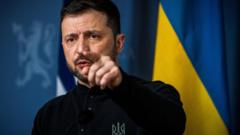As peace discussions loom, Ukrainian leader Volodymyr Zelensky calls for Russia to cease its "unnecessary" demands that threaten to extend the conflict. With a proposed ceasefire and military aid requests on the table, Zelensky's firm stance prioritizes Ukraine's sovereignty and territorial integrity.
Zelensky Urges Russia to Abandon Excessive Demands as Peace Talks Approach

Zelensky Urges Russia to Abandon Excessive Demands as Peace Talks Approach
Ukrainian President Volodymyr Zelensky emphasizes the need for realistic negotiations and military support ahead of impending peace talks with Russia in Saudi Arabia.
Article Text:
Ukrainian President Volodymyr Zelensky has called on Russia to forgo its excessive demands as the two nations prepare for crucial peace talks in Saudi Arabia on Monday, which will include US involvement. In light of these discussions, Zelensky pointed out that Russian President Vladimir Putin must stop making "unnecessary demands" that prolong the ongoing war, particularly Moscow's call for a complete halt of military support for Ukraine.
Zelensky conveyed that removing NATO membership from consideration in negotiations would be a massive concession to Russia. He firmly rejected claims by the White House regarding a proposed arrangement to transfer ownership of Ukraine's nuclear power facilities to the US, asserting that "all nuclear power plants belong to the people of Ukraine."
Recent conversations highlight the need for a ceasefire after over three years of conflict. While Zelensky confirmed that both he and Putin have agreed in principle to a truce, conflicting conditions have delayed actual implementation. The Russian leadership has indicated a willingness to cease air strikes targeting energy infrastructure; however, continued attacks from both sides suggest a ceasefire remains elusive.
As part of the upcoming talks, Zelensky has stated that a Ukrainian delegation plans to present a list of critical infrastructure needing protection from further Russian strikes. When pressed about the possibility of conceding land, specifically Crimea—a territory under Russian control since 2014—Zelensky firmly maintained that Crimea is an "integral part" of Ukraine, recognized internationally as such despite the ongoing occupation.
During a video conference with EU leaders, Zelensky reiterated calls for sustained military support. He requested at least €5 billion in artillery shells, emphasizing the crucial nature of ongoing assistance from European allies. Zelensky also stressed that the European Union must be involved in peace discussions, urging leaders not to relax pressure on Russia amid the ongoing war.
Ongoing violence continues, with recent strikes resulting in civilian casualties and Ukrainian drone attacks causing destruction within Russia. Meanwhile, UK Prime Minister Sir Keir Starmer has voiced the necessity of robust security arrangements in any prospective peace deal, indicating that military planning must commence before any agreements are finalized. He highlighted the importance of a comprehensive approach to ensure the sustainability of any deal reached with Russia, underscoring a consensus that mere agreements without solid backing are prone to violation.
As stakeholders engage in efforts to establish a firmer foundation for peace, questions remain about the pragmatism of negotiations and the pathways to a stable resolution to the conflict.
Ukrainian President Volodymyr Zelensky has called on Russia to forgo its excessive demands as the two nations prepare for crucial peace talks in Saudi Arabia on Monday, which will include US involvement. In light of these discussions, Zelensky pointed out that Russian President Vladimir Putin must stop making "unnecessary demands" that prolong the ongoing war, particularly Moscow's call for a complete halt of military support for Ukraine.
Zelensky conveyed that removing NATO membership from consideration in negotiations would be a massive concession to Russia. He firmly rejected claims by the White House regarding a proposed arrangement to transfer ownership of Ukraine's nuclear power facilities to the US, asserting that "all nuclear power plants belong to the people of Ukraine."
Recent conversations highlight the need for a ceasefire after over three years of conflict. While Zelensky confirmed that both he and Putin have agreed in principle to a truce, conflicting conditions have delayed actual implementation. The Russian leadership has indicated a willingness to cease air strikes targeting energy infrastructure; however, continued attacks from both sides suggest a ceasefire remains elusive.
As part of the upcoming talks, Zelensky has stated that a Ukrainian delegation plans to present a list of critical infrastructure needing protection from further Russian strikes. When pressed about the possibility of conceding land, specifically Crimea—a territory under Russian control since 2014—Zelensky firmly maintained that Crimea is an "integral part" of Ukraine, recognized internationally as such despite the ongoing occupation.
During a video conference with EU leaders, Zelensky reiterated calls for sustained military support. He requested at least €5 billion in artillery shells, emphasizing the crucial nature of ongoing assistance from European allies. Zelensky also stressed that the European Union must be involved in peace discussions, urging leaders not to relax pressure on Russia amid the ongoing war.
Ongoing violence continues, with recent strikes resulting in civilian casualties and Ukrainian drone attacks causing destruction within Russia. Meanwhile, UK Prime Minister Sir Keir Starmer has voiced the necessity of robust security arrangements in any prospective peace deal, indicating that military planning must commence before any agreements are finalized. He highlighted the importance of a comprehensive approach to ensure the sustainability of any deal reached with Russia, underscoring a consensus that mere agreements without solid backing are prone to violation.
As stakeholders engage in efforts to establish a firmer foundation for peace, questions remain about the pragmatism of negotiations and the pathways to a stable resolution to the conflict.






















